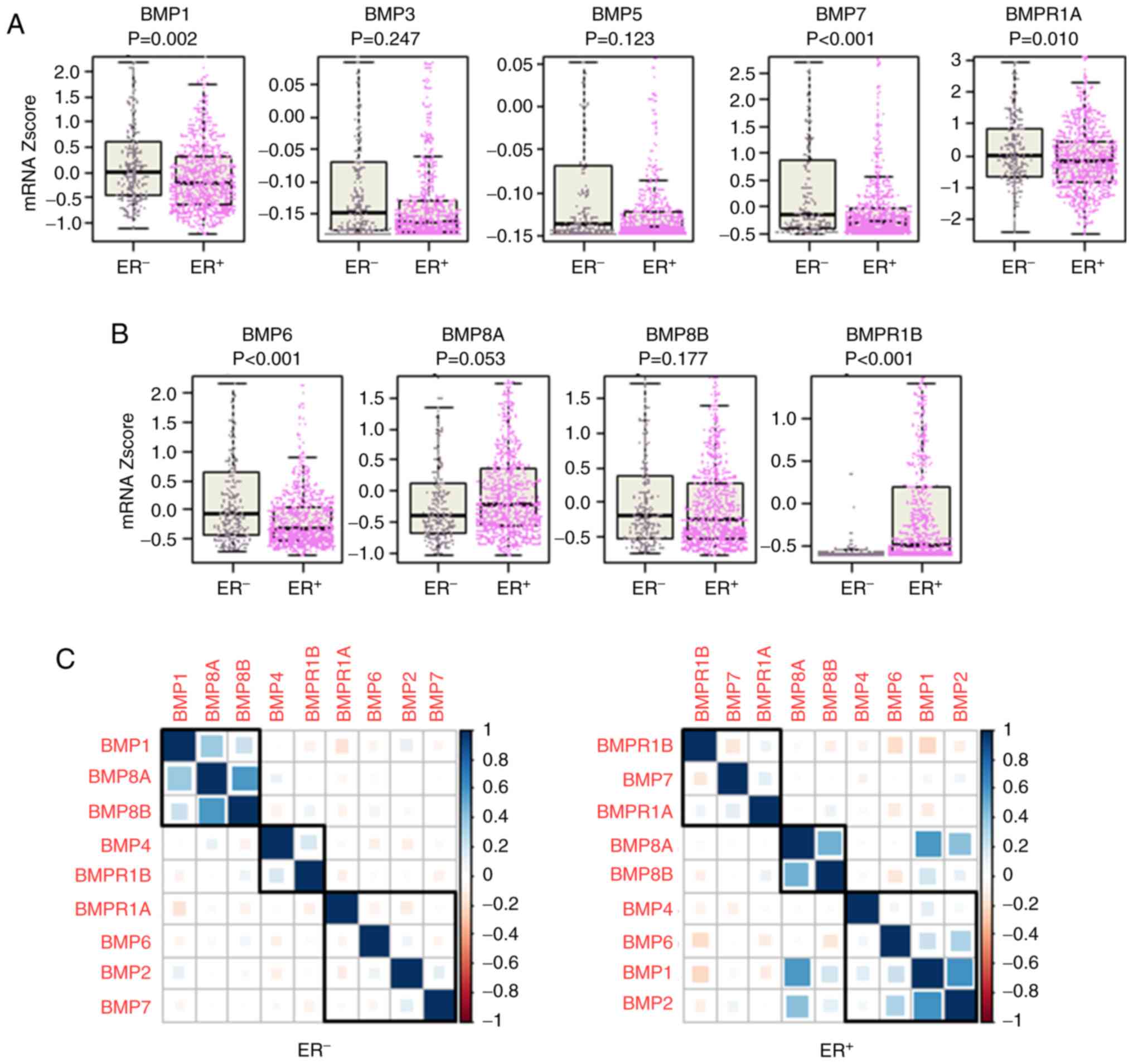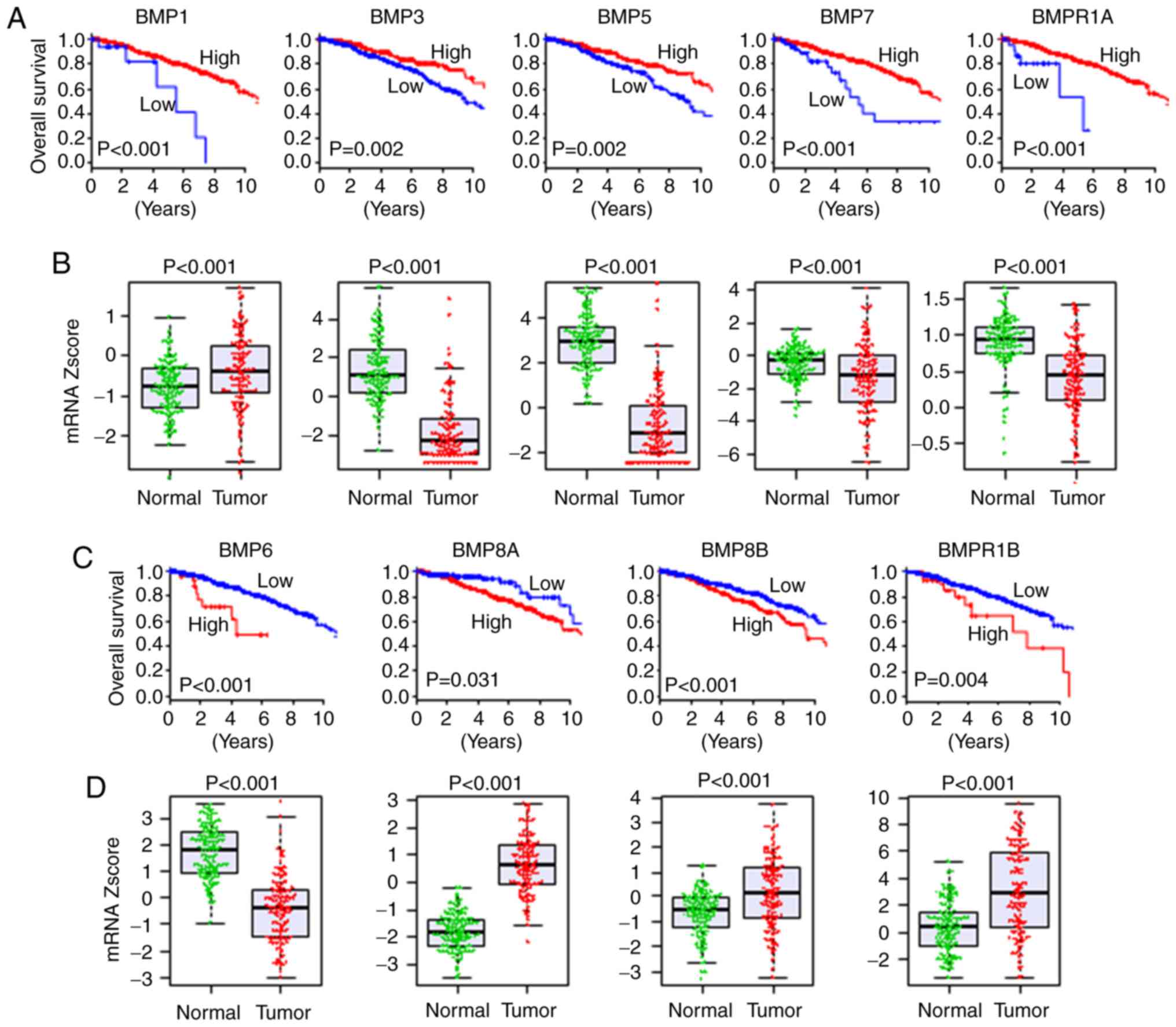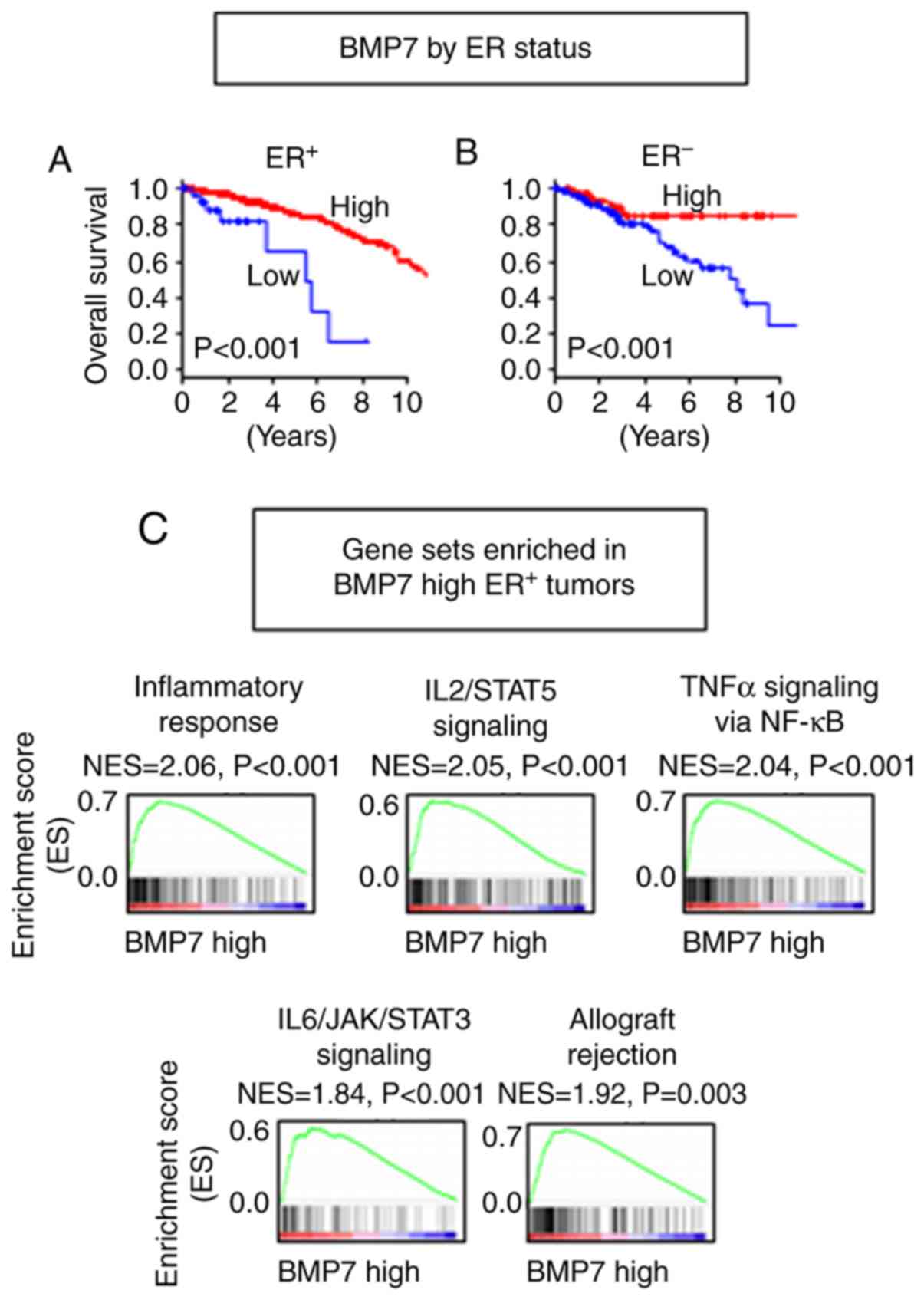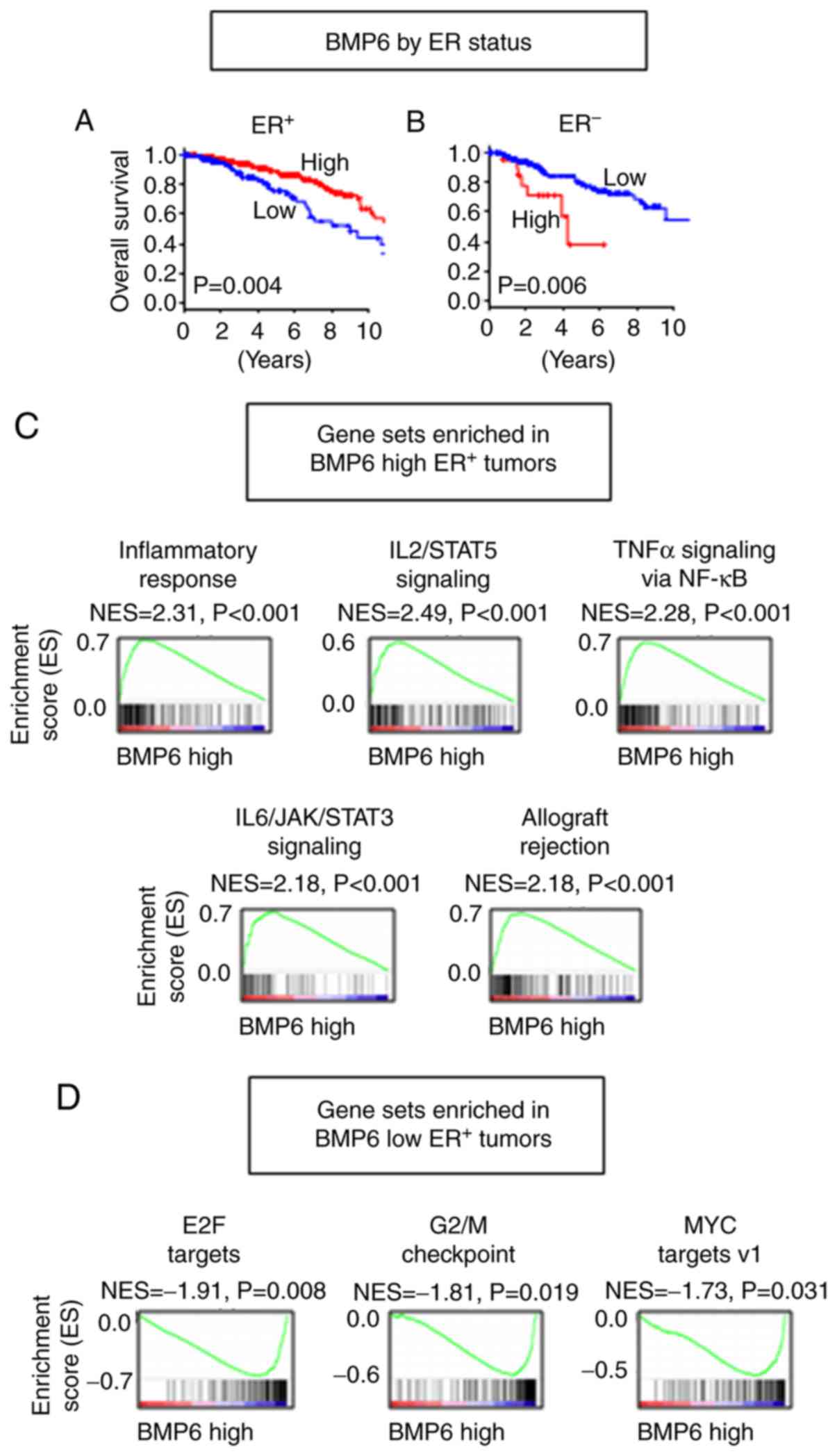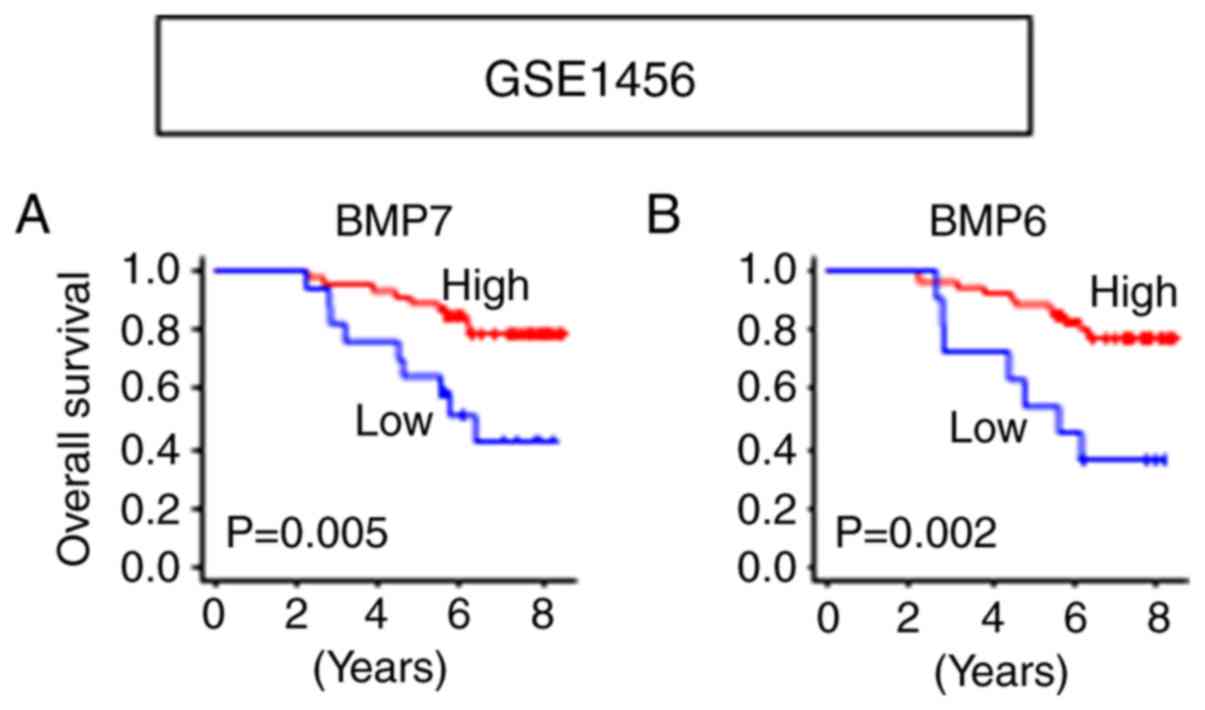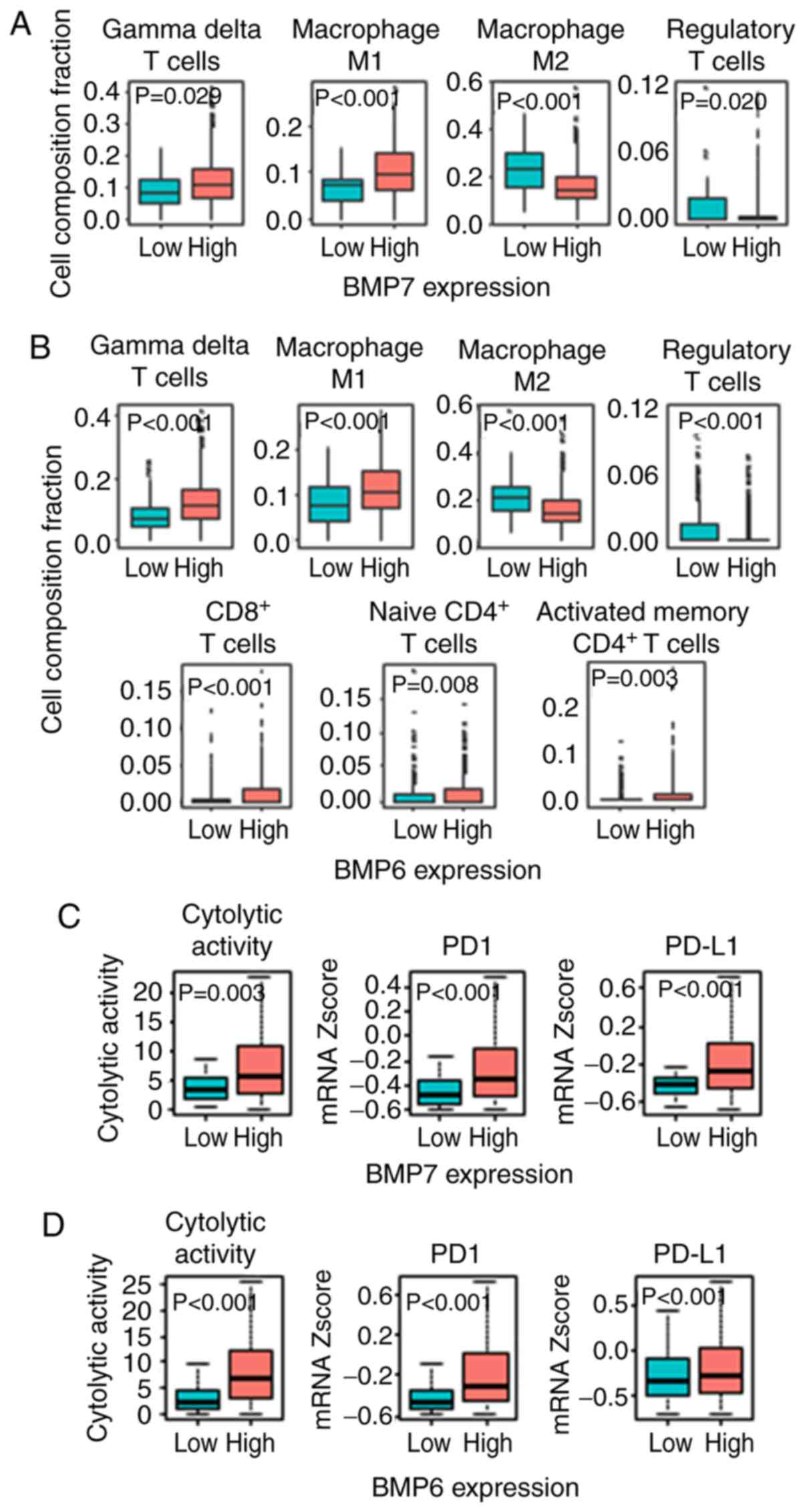|
1
|
Guo X and Wang XF: Signaling cross-talk
between TGF-beta/BMP and other pathways. Cell Res. 19:71–88. 2009.
View Article : Google Scholar : PubMed/NCBI
|
|
2
|
Wozney JM, Rosen V, Celeste AJ, Mitsock
LM, Whitters MJ, Kriz RW, Hewick RM and Wang EA: Novel regulators
of bone formation: Molecular clones and activities. Science.
242:1528–1534. 1988. View Article : Google Scholar : PubMed/NCBI
|
|
3
|
Langenfeld E, Kong Y and Langenfeld J:
Bone morphogenetic protein 2 stimulation of tumor growth involves
the activation of Smad-1/5. Oncogene. 25:685–692. 2006. View Article : Google Scholar : PubMed/NCBI
|
|
4
|
Alarmo EL, Kuukasjärvi T, Karhu R and
Kallioniemi A: A comprehensive expression survey of bone
morphogenetic proteins in breast cancer highlights the importance
of BMP4 and BMP7. Breast Cancer Res Treat. 103:239–246. 2007.
View Article : Google Scholar : PubMed/NCBI
|
|
5
|
Cao Y, Slaney CY, Bidwell BN, Parker BS,
Johnstone CN, Rautela J, Eckhardt BL and Anderson RL: BMP4 inhibits
breast cancer metastasis by blocking myeloid-derived suppressor
cell activity. Cancer Res. 74:5091–5102. 2014. View Article : Google Scholar : PubMed/NCBI
|
|
6
|
Guo D, Huang J and Gong J: Bone
morphogenetic protein 4 (BMP4) is required for migration and
invasion of breast cancer. Mol Cell Biochem. 363:179–190. 2012.
View Article : Google Scholar : PubMed/NCBI
|
|
7
|
Alarmo EL, Pärssinen J, Ketolainen JM,
Savinainen K, Karhu R and Kallioniemi A: BMP7 influences
proliferation, migration, and invasion of breast cancer cells.
Cancer Lett. 275:35–43. 2009. View Article : Google Scholar : PubMed/NCBI
|
|
8
|
Pickup MW, Hover LD, Guo Y, Gorska AE,
Chytil A, Novitskiy SV, Moses HL and Owens P: Deletion of the BMP
receptor BMPR1a impairs mammary tumor formation and metastasis.
Oncotarget. 6:22890–22904. 2015. View Article : Google Scholar : PubMed/NCBI
|
|
9
|
Yang L, Pang Y and Moses HL: TGF-beta and
immune cells: An important regulatory axis in the tumor
microenvironment and progression. Trends Immunol. 31:220–227. 2010.
View Article : Google Scholar : PubMed/NCBI
|
|
10
|
Lee GT, Jung YS, Ha YS, Kim JH, Kim WJ and
Kim IY: Bone morphogenetic protein-6 induces castration resistance
in prostate cancer cells through tumor infiltrating macrophages.
Cancer Sci. 104:1027–1032. 2013. View Article : Google Scholar : PubMed/NCBI
|
|
11
|
Green TP, Fennell M, Whittaker R, Curwen
J, Jacobs V, Allen J, Logie A, Hargreaves J, Hickinson DM,
Wilkinson RW, et al: Preclinical anticancer activity of the potent,
oral Src inhibitor AZD0530. Mol Oncol. 3:248–261. 2009. View Article : Google Scholar : PubMed/NCBI
|
|
12
|
Chin L, Andersen JN and Futreal PA: Cancer
genomics: From discovery science to personalized medicine. Nat Med.
17:297–303. 2011. View Article : Google Scholar : PubMed/NCBI
|
|
13
|
Cerami E, Gao J, Dogrusoz U, Gross BE,
Sumer SO, Aksoy BA, Jacobsen A, Byrne CJ, Heuer ML, Larsson E, et
al: The cBio cancer genomics portal: An open platform for exploring
multidimensional cancer genomics data. Cancer Discov. 2:401–404.
2012. View Article : Google Scholar : PubMed/NCBI
|
|
14
|
Gao J, Aksoy BA, Dogrusoz U, Dresdner G,
Gross B, Sumer SO, Sun Y, Jacobsen A, Sinha R, Larsson E, et al:
Integrative analysis of complex cancer genomics and clinical
profiles using the cBioPortal. Sci Signal. 6:pl12013. View Article : Google Scholar : PubMed/NCBI
|
|
15
|
Terakawa T, Katsuta E, Yan L, Turaga N,
McDonald KA, Fujisawa M, Guru KA and Takabe K: High expression of
SLCO2B1 is associated with prostate cancer recurrence after radical
prostatectomy. Oncotarget. 9:14207–14218. 2018. View Article : Google Scholar : PubMed/NCBI
|
|
16
|
Hirose Y, Nagahashi M, Katsuta E, Yuza K,
Miura K, Sakata J, Kobayashi T, Ichikawa H, Shimada Y, Kameyama H,
et al: Generation of sphingosine-1-phosphate is enhanced in biliary
tract cancer patients and is associated with lymphatic metastasis.
Sci Rep. 8:108142018. View Article : Google Scholar : PubMed/NCBI
|
|
17
|
Young J, Kawaguchi T, Yan L, Qi Q, Liu S
and Takabe K: Tamoxifen sensitivity-related microRNA-342 is a
useful biomarker for breast cancer survival. Oncotarget.
8:99978–99989. 2017. View Article : Google Scholar : PubMed/NCBI
|
|
18
|
Hoki T, Katsuta E, Yan L, Takabe K and Ito
F: Low DMT1 expression associates with increased oxidative
phosphorylation and early recurrence in hepatocellular carcinoma. J
Surg Res. 234:343–352. 2019. View Article : Google Scholar : PubMed/NCBI
|
|
19
|
Sporn JC, Katsuta E, Yan L and Takabe K:
Expression of microRNA-9 is associated with overall survival in
breast cancer patients. J Surg Res. 233:426–435. 2019. View Article : Google Scholar : PubMed/NCBI
|
|
20
|
Katsuta E, Qi Q, Peng X, Hochwald SN, Yan
L and Takabe K: Pancreatic adenocarcinomas with mature blood
vessels have better overall survival. Sci Rep. 9:13102019.
View Article : Google Scholar : PubMed/NCBI
|
|
21
|
Pawitan Y, Bjöhle J, Amler L, Borg AL,
Egyhazi S, Hall P, Han X, Holmberg L, Huang F, Klaar S, et al: Gene
expression profiling spares early breast cancer patients from
adjuvant therapy: Derived and validated in two population-based
cohorts. Breast Cancer Res. 7:R953–R964. 2005. View Article : Google Scholar : PubMed/NCBI
|
|
22
|
Goldhirsch A, Wood WC, Coates AS, Gelber
RD, Thürlimann B, Senn HJ and Panel members: Strategies for
subtypes-dealing with the diversity of breast cancer: Highlights of
the St Gallen international expert consensus on the primary therapy
of early breast cancer 2011. Ann Oncol. 22:1736–1747. 2011.
View Article : Google Scholar : PubMed/NCBI
|
|
23
|
Subramanian A, Tamayo P, Mootha VK,
Mukherjee S, Ebert BL, Gillette MA, Paulovich A, Pomeroy SL, Golub
TR, Lander ES and Mesirov JP: Gene set enrichment analysis: A
knowledge-based approach for interpreting genome-wide expression
profiles. Proc Natl Acad Sci USA. 102:15545–15550. 2005. View Article : Google Scholar : PubMed/NCBI
|
|
24
|
Katsuta E, Yan L, Nagahashi M, Raza A,
Sturgill JL, Lyon DE, Rashid OM, Hait NC and Takabe K: Doxorubicin
effect is enhanced by sphingosine-1-phosphate signaling antagonist
in breast cancer. J Surg Res. 219:202–213. 2017. View Article : Google Scholar : PubMed/NCBI
|
|
25
|
Newman AM, Liu CL, Green MR, Gentles AJ,
Feng W, Xu Y, Hoang CD, Diehn M and Alizadeh AA: Robust enumeration
of cell subsets from tissue expression profiles. Nat Methods.
12:453–457. 2015. View Article : Google Scholar : PubMed/NCBI
|
|
26
|
Charoentong P, Finotello F, Angelova M,
Mayer C, Efremova M, Rieder D, Hackl H and Trajanoski Z: Pan-cancer
immunogenomic analyses reveal genotype-immunophenotype
relationships and predictors of response to checkpoint blockade.
Cell Rep. 18:248–262. 2017. View Article : Google Scholar : PubMed/NCBI
|
|
27
|
Rooney MS, Shukla SA, Wu CJ, Getz G and
Hacohen N: Molecular and genetic properties of tumors associated
with local immune cytolytic activity. Cell. 160:48–61. 2015.
View Article : Google Scholar : PubMed/NCBI
|
|
28
|
Narayanan S, Kawaguchi T, Yan L, Peng X,
Qi Q and Takabe K: Cytolytic activity score to assess anticancer
immunity in colorectal cancer. Ann Surg Oncol. 25:2323–2331. 2018.
View Article : Google Scholar : PubMed/NCBI
|
|
29
|
Ye L, Bokobza S, Li J, Moazzam M, Chen J,
Mansel RE and Jiang WG: Bone morphogenetic protein-10 (BMP-10)
inhibits aggressiveness of breast cancer cells and correlates with
poor prognosis in breast cancer. Cancer Sci. 101:2137–2144. 2010.
View Article : Google Scholar : PubMed/NCBI
|
|
30
|
Sudhan DR, Schwarz LJ, Guerrero-Zotano A,
Formisano L, Nixon MJ, Croessmann S, González Ericsson PI, Sanders
M, Balko JM, Avogadri-Connors F, et al: Extended adjuvant therapy
with neratinib plus fulvestrant blocks ER/HER2 crosstalk and
maintains complete responses of ER+/HER2+
breast cancers: Implications to the ExteNET trial. Clin Cancer Res.
25:771–783. 2019. View Article : Google Scholar : PubMed/NCBI
|
|
31
|
Athanasios F, Afrodite N, Effstratios P
and Demetrios K: Co-expression of bone morphogenetic protein 6 with
estrogen receptor a in endometriosis. Arch Gynecol Obstet.
285:1001–1007. 2012. View Article : Google Scholar : PubMed/NCBI
|
|
32
|
Shee K, Jiang A, Varn FS, Liu S, Traphagen
NA, Owens P, Ma CX, Hoog J, Cheng C, Golub TR, et al: Cytokine
sensitivity screening highlights BMP4 pathway signaling as a
therapeutic opportunity in ER(+) breast cancer. FASEB J.
33:1644–1657. 2019. View Article : Google Scholar : PubMed/NCBI
|
|
33
|
Liberzon A, Birger C, Thorvaldsdóttir H,
Ghandi M, Mesirov JP and Tamayo P: The molecular signatures
database (MSigDB) hallmark gene set collection. Cell Syst.
1:417–425. 2015. View Article : Google Scholar : PubMed/NCBI
|
|
34
|
Davies SR, Watkins G, Douglas-Jones A,
Mansel RE and Jiang WG: Bone morphogenetic proteins 1 to 7 in human
breast cancer, expression pattern and clinical/prognostic
relevance. J Exp Ther Oncol. 7:327–338. 2008.PubMed/NCBI
|
|
35
|
Takahashi M, Otsuka F, Miyoshi T, Otani H,
Goto J, Yamashita M, Ogura T, Makino H and Doihara H: Bone
morphogenetic protein 6 (BMP6) and BMP7 inhibit estrogen-induced
proliferation of breast cancer cells by suppressing p38
mitogen-activated protein kinase activation. J Endocrinol.
199:445–455. 2008. View Article : Google Scholar : PubMed/NCBI
|
|
36
|
Alarmo EL, Korhonen T, Kuukasjärvi T,
Huhtala H, Holli K and Kallioniemi A: Bone morphogenetic protein 7
expression associates with bone metastasis in breast carcinomas.
Ann Oncol. 19:308–314. 2008. View Article : Google Scholar : PubMed/NCBI
|
|
37
|
Yang S, Du J, Wang Z, Yuan W, Qiao Y,
Zhang M, Zhang J, Gao S, Yin J, Sun B and Zhu T: BMP-6 promotes
E-cadherin expression through repressing deltaEF1 in breast cancer
cells. BMC Cancer. 7:2112007. View Article : Google Scholar : PubMed/NCBI
|
|
38
|
Du J, Yang S, An D, Hu F, Yuan W, Zhai C
and Zhu T: BMP-6 inhibits microRNA-21 expression in breast cancer
through repressing deltaEF1 and AP-1. Cell Res. 19:487–496. 2009.
View Article : Google Scholar : PubMed/NCBI
|
|
39
|
Lian WJ, Liu G, Liu YJ, Zhao ZW, Yi T and
Zhou HY: Downregulation of BMP6 enhances cell proliferation and
chemoresistance via activation of the ERK signaling pathway in
breast cancer. Oncol Rep. 30:193–200. 2013. View Article : Google Scholar : PubMed/NCBI
|
|
40
|
Tandon A, Sharma A, Rodier JT, Klibanov
AM, Rieger FG and Mohan RR: BMP7 gene transfer via gold
nanoparticles into stroma inhibits corneal fibrosis in vivo. PLoS
One. 8:e664342013. View Article : Google Scholar : PubMed/NCBI
|
|
41
|
Schmidt J, Weijdegård B, Mikkelsen AL,
Lindenberg S, Nilsson L and Brännström M: Differential expression
of inflammation-related genes in the ovarian stroma and granulosa
cells of PCOS women. Mol Hum Reprod. 20:49–58. 2014. View Article : Google Scholar : PubMed/NCBI
|















